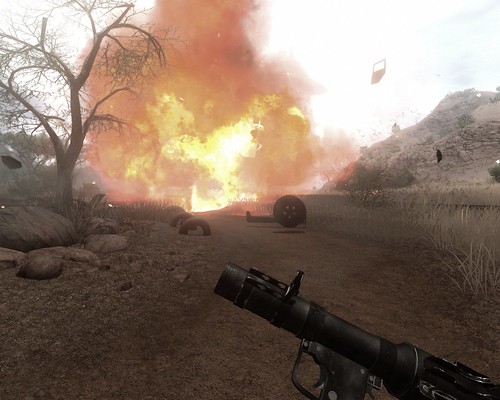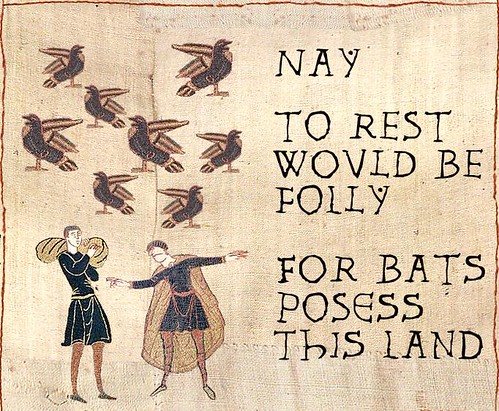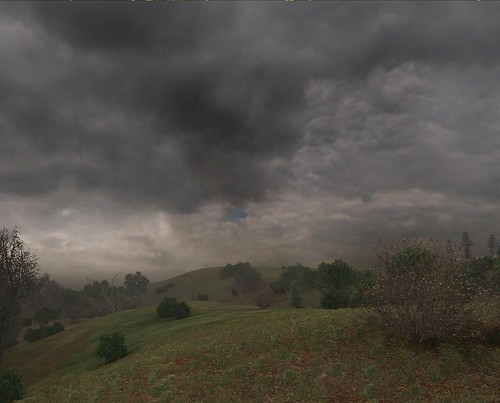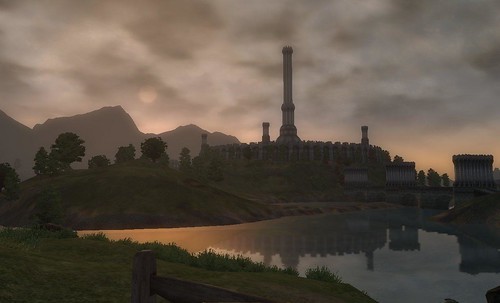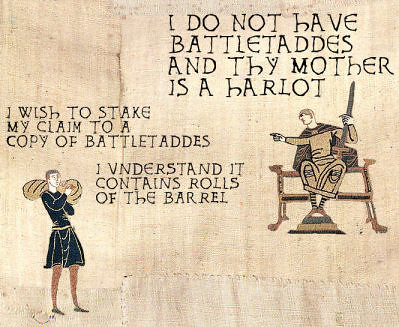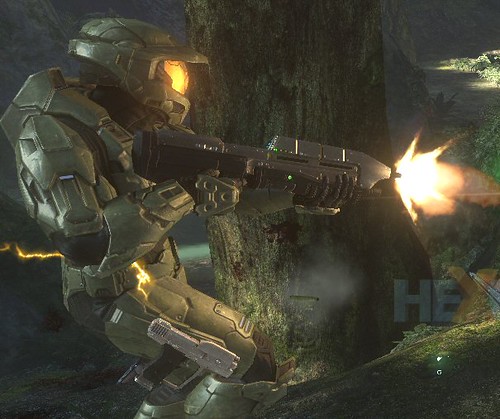
A couple of weeks before it’s official release I got the chance to visit Microsoft HQ in Sydney and play a preview build of the now defunct Ensemble studio’s Xbox RTS Halo Wars. I wrote up a little bit of what I thought for Kotaku Australia as part of the competition I won to go and play it. You can read what I said via the link, but essentially what I most wanted to express was that This is a game that knows what it wants to be, but I’m going to tell you that’s not exactly a good thing.
It’s the Halo Universe, even down to the splash of the plasma weapons. Edge Magazine noted in a review that appeared online briefly that the game is unashamedly a console one, and to paraphrase the reviewer, they said that “Halo Wars stares you down and says ‘This here’s console country, we do things a little differently’.” It’s strange because I get the feeling most games fail because of the opposite problem – often grafting in ancillary ideas from other games and genres in an effort to siphon their success. In development circles it’s known as ‘feature creep’.
So Halo Wars knows what it wants to be and we the audience already know what to expect. Kieron Gillen in his review of the game for Eurogamer said of the game that,
The biggest strength… is the fact that most people understand the Halo universe. It's not just the geek thrill of seeing a Scarab in action - it's that you understand what the Scarab means on the battlefield (trouble). We know which characters are best against tanks, and which are probably best in special vehicles.
Given that foreknowledge, Ensemble is (was?) hardly the studio to farm out a cheap sequel to – so where did they carve out a creative space of their own? Where did they leave their mark on the Halo universe? Unless you count inventing some new units, basically nowhere – and unless there’s another story behind the scenes, they seemed perfectly happy to do that. But, as we saw with the discussion surrounding FEAR 2, is “good enough” really good enough anymore?
Halo Wars is a nostalgia fest, make no mistake, and it would be easy to cynically view it as an attempt by Microsoft’s to cash in on one of their more successful pieces of videogame intellectual property. I’m giving them the benefit of the doubt, however, and I’m going to suggest that it was probably only partly an exercise in ensuring gamers maintain some interest in the Halo franchise. Ensemble’s efforts at channelling the Bungie vibe seem to fall well short of the mark, failing to spin as convincing and exciting a yarn as their predecessors (caveat: I haven’t finished the game yet). Ironically, one of the points Marty O’Donnell made in my interview with him was that some people are just better story tellers than others and for whatever else you can fault them, Bungie do often manage to tell a good story.
So Halo Wars rests in that uncomfortable half-way place between a creative and original expansion of the universe and outsourced publisher cash-in. I admit it would be self-aggrandizing to try and account for this by blaming it on the misappropriation of ‘classic’ Halo sounds in the game, but at the very least it is a symptom of the larger problem at hand.
Indeed, we saw it happening from the first trailer which was itself a studied exercise in comforting the confused and afraid fans. Halo is changing?! But I like Halo the way it is! Change is scary and confusing. Did the marketing executives focus test that first trailer to see whether that perception was actually correct? It is obvious that is what they were thinking, even electing to preserve as much of the ‘classic’ Halo as they could.
The look of Halo was obviously always going to change – that much was evident from both the first trailer and the fact that the game itself would change into an RTS. But the sounds, ‘Oh no’, the executives said with a million dollar smile, ‘The classic sounds we can preserve!’ In actuality, it was probably closer to someone saying ‘Hey, can we get the Halo plasma rifle sounds for our trailer? Sweet!’ and then they never considered changing out these place holders.
In my thesis which examined the sound and music of Halo 2, one of the main discoveries was an identifiable link between the music and sound effects – that a level of ‘musicality’ is imparted into the sound effects via common timbres and pitches. Many of the covenant weapon sounds were in fact produced using similar synthetic techniques, even the same instruments that were used in the production of music tracks which ended up picking up the role as musical themes for the covenant. These same sound effects have now been re-used in Halo Wars in much the same way that ‘stock’ library sounds would – and the result is an unnatural grafting along with the loss of their musical context.
‘Stock’ audio from bought libraries of recordings is often used in films (and games) in order to keep down recording costs and, occasionally, to artistically draw upon their sonic history. The ‘Wilhelm Scream’ doesn’t just sound like a scream for western listeners, if you’ve had even a moderate exposure to late 20th Century films, you will have heard it enough times that it has become a scream. We hear the Wilhelm scream and know instantly what it means because we have heard it in context before. The sound itself has a history – we’ve heard it in Star Wars, we’ve heard it in Indiana Jones, and we’ve heard it in a million other movies since.
But stock sounds, like the Wilhelm scream, are designed to be memorable on their own, whereas the Halo sounds are made memorable by their connection to music and ‘level ambience’. The blurring of the lines between diegetic and non-diegetic sound and music in Halo 2 is a powerful technique that, in my mind, makes the sonic material all the more powerful. (See Chapter 4.4 of my thesis for a much more detailed discussion and an explanation of why it is such an effective technique.)
Halo Wars re-uses weapon sound effects from earlier Halo games with the aim of capitalizing on our history and experiences with them. We are encouraged to think back to those Halcyon days of Halo 3 and earlier, remembering our positive experiences with them. While it is a problem that these sounds don’t have nearly as much of a history as sounds such as the Wilhelm scream, lessening their historical impact, the more serious problem is that these sounds aren’t designed to exist without their musical and level-based context. Halo Wars carries the legacy sound effects of the Halo universe while unceremoniously dumping their musical counterparts. In losing their musical context, they have lose much of their attractiveness.
The argument for sonic ‘continuity’ between the Halo series is pre-eminently redundant – with every Bungie made Halo game, you get everything changing. From weapons and character designs to the visuals and the sounds, they are all subtly changed and revaluated. Even the way that sounds are mixed together live (what Marty says is actually half of what makes good game sound) is constantly being refined, polished and improved also. Bungie knows the value in re-imagining, redesigning and reconceptualising - even if we occasionally prefer aspects of the old to the new.
In the end, Ensemble opted for safety in their final game – and honestly it’s a struggle to blame them. Halo Wars is still horribly polished, and it’s still Halo… but it’s not really Ensemble saying ‘If we did Halo, what would we do differently?’ Instead it’s Ensemble kowtowing to the marketers, and more’s the pity. The sound, it’s really just a symptom of the wider problem – a disappointing lack of imagination.


